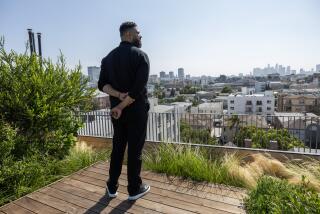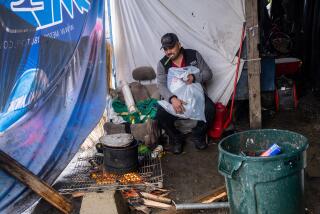DOWNTOWN : Domes Could Aid Kobe Quake Victims
- Share via
A group from Kobe, Japan, researching ways to provide shelter for those left homeless by that city’s devastating earthquake, recently visited Genesis 1, a project that uses geodesic domes to house the homeless.
During their visit to Los Angeles last week, Japanese businessmen said 30,000 people remain homeless in Kobe, which was rocked by a 6.8-magnitude quake Jan. 17.
Although repair work is progressing smoothly on damaged infrastructures such as railways, the housing crisis remains a problem, with thousands still living in temporary shelters in high schools or next to the rubble of their homes.
Some of the homeless are still being housed in tents.
Yoshinori Mizuta, president of the Genesis Kobe Restoration Village, which is what the group calls its project, said victims still residing in shelters need to become used to living in communities again.
Mizuta hopes to duplicate the strategy of Genesis 1, which houses 21 people who share responsibility for the community built on a parking lot just outside of Downtown.
The 18-month-old Genesis 1, which began with a $250,000 grant from Arco, provides transitional housing for homeless people. Residents live two to a dome, and the site’s kitchen and community center are also housed in a dome. The project, which had been struggling financially, has received a $161,461 federal grant that it will use to operate for the next several years.
“This Genesis 1 [concept] allows us to bring those people back to a social life,” Mizuta said through an interpreter. “Through a community life, they can help each other.”
Mizuta, an architect and developer, arrived in Los Angeles last week to study Genesis 1 and meet with the manufacturer of the geodesic domes.
In Kobe, the local government is struggling to provide temporary housing, and refugees are facing the prospect of months in relief camps. There also is a need to provide temporary housing for construction workers rebuilding the city, Mizuta said.
Mizuta said he wants to get his project built soon, possibly beginning in six months. He said several Kobe charities support his plan to build a pilot geodesic dome village for refugees. The group plans to organize a fund-raiser after returning to Kobe next week.
Once the project is built, he hopes to win support--and eventually a contract--from the local government.
“The people who are homeless begin to adapt to being homeless,” said Ted Hayes, director of Genesis 1. “They are not just trying to provide provisional housing, they are trying to restore minds.”
Mizuta’s organization isn’t the only private agency in Kobe interested in the concept. Randy Morrison, vice president of Los Angeles-based World Shelter, which manufactures the geodesic domes, said he has been contacted by four other companies interested in buying the domes for use in Kobe.
World Shelter has also just completed a California pilot program at Beals Point State Park near Folsom. In an effort to recruit campers who are disabled or are single parents, the state contracted with Morrison’s company to install 11 rental domes in the park.
“They are like little miniature cabins,” said Morrison. “They were looking for the new, modern tent-cabin.”
Morrison’s domes, made of a fiberglass material, range in cost from $3,500 for a 14-foot diameter dome to $6,500 for a 20-foot model.
More to Read
Sign up for Essential California
The most important California stories and recommendations in your inbox every morning.
You may occasionally receive promotional content from the Los Angeles Times.










